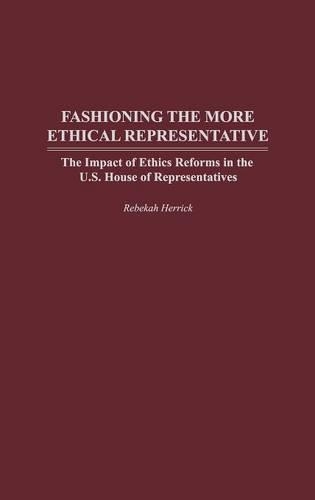
Fashioning the More Ethical Representative: The Impact of Ethics Reforms in the U.S. House of Representatives
(Hardback)
Publishing Details
Fashioning the More Ethical Representative: The Impact of Ethics Reforms in the U.S. House of Representatives
By (Author) Rebekah Herrick
Bloomsbury Publishing PLC
Praeger Publishers Inc
30th August 2003
United States
Classifications
General
Non Fiction
328.73072
Physical Properties
Hardback
168
Description
An ethics climate of suspicion and concern about conflicts of interest exists in U.S. politics, resulting in efforts to improve ethical conduct for Congress and an infrastructure to enforce them. Herrick examines various effects of the climate and ethics standards on the House of Representatives. The reforms had a positive effect on members' behavior with few costs. The ethics rules addressed behaviors that potentially harm the legislative process and House members altered their behavior to comply with the rules. Members who violate the standards were less likely to leave Congress, although a lack of electoral competition and members' power in the chamber can insolate them from electoral defeat or forced retirement. As Herrick documents, the concern with congressional ethics increased the number of members accused of unethical behavior and consequently modestly decreased the public's approval of Congress. But, by disciplining members, the new ethics increased congressional approval. Other negative effects include encouraging ethical members to retire, modestly decreasing the number of bills passed, and preventing members accused of violating the rules from carrying out their responsibilities. As a way to understand how to further improve members' ethics, Herrick offers a model that predicts which members were likely to violate the ethics standards. Based on the findings, three recommendations are offered to improve the ethics process: improve congressional elections, create an outside commission to investigate ethics violations, and discourge false charges against members.
Reviews
.,."An excellent examination of ethical misbehavior in the U.S. House of Representatives, its possible causes, the impact confronting such behavior for the work of the House and members' constituents, the outcomes of accusations, and ends with three concrete suggestions for improving the House's ethical climate. The work is especially compelling in its empirical analysis that shows a well informed electorate and quality candidates in competitive elections reduce the level of unethical conduct."-Samuel H. Fisher III Associate Professor of Political Science, Department of Political Science and Criminal Justice, University of South Alabama
Given the proliferation of interest in congressional ethics in recent years, it is surprising that congressional scholars have not written more about members' ethics. Herrick's book helps fill a void in this area. It is a significant attempt to determine the effects of the ethics climate on the House of Representatives since ethic reforms were adopted by Congress in 1977....Highly recommended. General readers and lower-division undergraduate collections and above.-Choice
"Given the proliferation of interest in congressional ethics in recent years, it is surprising that congressional scholars have not written more about members' ethics. Herrick's book helps fill a void in this area. It is a significant attempt to determine the effects of the ethics climate on the House of Representatives since ethic reforms were adopted by Congress in 1977....Highly recommended. General readers and lower-division undergraduate collections and above."-Choice
Author Bio
REBEKAH HERRICK is Associate Professor of Political Science at Oklahoma State University. Her teaching and research interests include congressional behavior, congressional elections, and gender and politics. She has published in a variety of scholarly journals, including American Politics Quarterly, Journal of Politics, Legislative Studies Quarterly, Social Science Journal, and Women & Politics.
